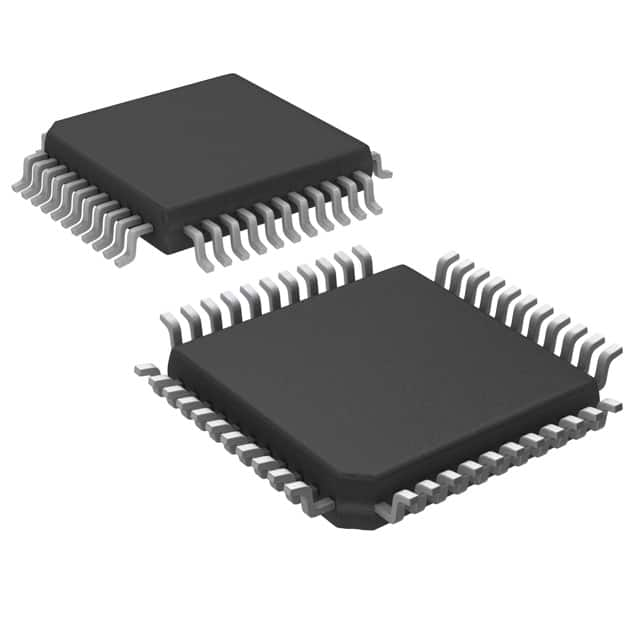PIC16C77-20E/PQ
Product Category
The PIC16C77-20E/PQ belongs to the category of microcontrollers, specifically designed for embedded control applications.
Basic Information Overview
- Use: The PIC16C77-20E/PQ is used for controlling various electronic devices and systems, including consumer electronics, automotive applications, industrial automation, and more.
- Characteristics: It features low power consumption, high performance, and a wide range of peripherals for versatile applications.
- Package: The PIC16C77-20E/PQ is available in a PQFP package, which provides a compact and reliable form factor for integration into electronic designs.
- Essence: This microcontroller serves as a key component in enabling precise and efficient control in embedded systems.
- Packaging/Quantity: The PIC16C77-20E/PQ is typically supplied in reels or tubes, with quantities varying based on manufacturer specifications.
Specifications
The PIC16C77-20E/PQ features a 8-bit CPU core, flash program memory, EEPROM data memory, and a range of integrated peripherals including timers, communication interfaces, and analog-to-digital converters. It operates at a maximum frequency of 20 MHz and supports various voltage levels for compatibility with different system requirements.
Detailed Pin Configuration
The detailed pin configuration of the PIC16C77-20E/PQ includes multiple I/O pins, power supply connections, oscillator inputs, and communication interface pins. These are arranged in a specific layout to facilitate easy integration into circuit designs.
Functional Features
The functional features of the PIC16C77-20E/PQ include its ability to execute complex control algorithms, interface with external sensors and actuators, communicate with other devices, and manage power efficiently. Its integrated peripherals enable diverse functionality within embedded systems.
Advantages and Disadvantages
Advantages: - Versatile peripheral set for diverse application support - Low power consumption for energy-efficient designs - Flash program memory for flexible firmware updates
Disadvantages: - Limited processing power compared to higher-end microcontrollers - Restricted memory capacity for larger-scale applications
Working Principles
The PIC16C77-20E/PQ operates based on the principles of executing instructions stored in its program memory, interacting with external components through its I/O pins, and managing system resources to achieve the desired control outcomes. It follows a sequential execution model to process tasks and respond to external stimuli.
Detailed Application Field Plans
The PIC16C77-20E/PQ finds extensive use in applications such as home appliances, automotive control systems, industrial automation, medical devices, and consumer electronics. Its versatility allows it to be employed in a wide range of embedded control scenarios where precise and reliable operation is essential.
Detailed and Complete Alternative Models
Some alternative models to the PIC16C77-20E/PQ include the PIC16F877A, ATmega328P, STM32F103C8T6, and MSP430G2553. Each of these alternatives offers unique features and capabilities, providing designers with options to best match the requirements of their specific applications.
In conclusion, the PIC16C77-20E/PQ microcontroller serves as a fundamental building block for embedded control systems, offering a balance of performance, flexibility, and integration capabilities to enable a wide array of applications across various industries.
Word count: 410
Senaraikan 10 soalan dan jawapan biasa yang berkaitan dengan aplikasi PIC16C77-20E/PQ dalam penyelesaian teknikal
What is the operating voltage range of PIC16C77-20E/PQ?
- The operating voltage range of PIC16C77-20E/PQ is 4.5V to 5.5V.What is the maximum clock frequency supported by PIC16C77-20E/PQ?
- The maximum clock frequency supported by PIC16C77-20E/PQ is 20 MHz.Can PIC16C77-20E/PQ be used in automotive applications?
- Yes, PIC16C77-20E/PQ can be used in automotive applications.What are the communication interfaces supported by PIC16C77-20E/PQ?
- PIC16C77-20E/PQ supports USART, SPI, and I2C communication interfaces.Is PIC16C77-20E/PQ suitable for battery-powered devices?
- Yes, PIC16C77-20E/PQ is suitable for battery-powered devices due to its low power consumption.What are the available memory options in PIC16C77-20E/PQ?
- PIC16C77-20E/PQ has 8K words of program memory and 368 bytes of data memory.Can PIC16C77-20E/PQ be used in industrial control systems?
- Yes, PIC16C77-20E/PQ can be used in industrial control systems.Does PIC16C77-20E/PQ have built-in analog-to-digital converters (ADC)?
- No, PIC16C77-20E/PQ does not have built-in ADCs.What development tools are available for programming PIC16C77-20E/PQ?
- Development tools such as MPLAB X IDE and PICkit programmers are available for programming PIC16C77-20E/PQ.Is PIC16C77-20E/PQ RoHS compliant?
- Yes, PIC16C77-20E/PQ is RoHS compliant, making it suitable for use in environmentally sensitive applications.


